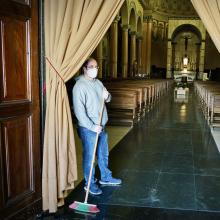Opinion
One of the biggest gleanings from Mrs. America is that women and their motivations for power are complicated and far from monolithic.
Burton and Dreher share similar aesthetic views about Christianity and the past.
Rev. Jim Wallis talks with theologian and immigrant advocate Karen González about the lessons of immigration in the Bible. The metrics of the COVID-19 pandemic show how disproportionately affected our immigrant and refugee neighbors have been.
At the end of the semester, I snipped an iris at its base, the luminous purple petals reminding me of our history as resilient people in diverse places. During my closing online class, I showed the students a vase of flowers, which my daughter and I had arranged on the wrought-iron table on my deck. Maybe I was subconsciously using perennials that return each year as some obvious metaphor for persistence as they peered at me from their childhood homes in California, Texas, South Carolina, and Maine.
Much has been written about the ways in which the pandemic is exposing the fragility of our communities and the underlying vulnerabilities that were ignored. Over the years, Father’s Heart has tried to do what it can to knit the fraying margins of the neighborhood back into the whole, by reminding people of their God-given dignity and worth. But they are working against decades-long policies that have kept so many New Yorkers from accessing affordable housing and better paying jobs.

Image via Pip R. Lagenta/Flickr
Speculative futurism isn’t mentally escaping into a future that is either far more dystopic than our present or far more utopic than we should expect — nihilistically leaning into our sense of dread and doom, or engaging an escapist fantasy that all will be better someday and calling this ungrounded vision “hope” can both be momentarily comforting. A speculative futurist ecclesiology looks at every fault line exposed by this pandemic alongside every gift and grace it illuminates.
We believe all human beings are made in the “imago dei,” the image and likeness of God — it’s a core tenet of ours and many other faiths. Just as the COVID-19 pandemic has revealed how injustices in our health care and safety net systems stand in stark contrast to that core ideal, so too does any strategy that would negate a people’s votes because of the color of their skin. It is not just a partisan tactic, but rather a denial of their imago dei, a theological, biblical, and spiritual offense to God. Protecting the right to vote affirms the divine imprint and inherent value of all of God’s children.
When will the lives of black people ever matter to America? Black people are tired.
Faye Brown was 23 when she went to prison. This week a coroner will report that Brown died at a local hospital of complications from the coronavirus at the age of 67.
What value is there in circulating a depiction of innocent black death?
"I think that the word of God gives us the remedy for a lot when crisis comes. I think that the reality of our theology has to do with the theodicy of God — why does God allow bad things to happen? There’s the communicating, conveying, and teaching about managing crisis; 'How does God view crisis? Is he the author of crisis or is the crisis that we see an experience in our world as a result of something else or someone else?' So really, [ we are] educating our people teaching them the word of God, and using scripture as an example of how to survive, almost any kind of crisis."
President-elect of Bread for the World Rev. Eugene Cho talks with Rev. Jim Wallis about the need for faith leaders to speak out about politics in the time of the coronavirus.

Man at work cleaning the floor waiting for the reopening of the church. Turin, Italy. Photo by MikeDotta / Shutterstock.com
While states haven’t been imposing restrictions particular to houses of worship, they have thus far been limiting social gatherings, many states restricting groups to no more than 10 people. As they begin allowing gatherings of up to 50 people, and eventually larger gatherings with specific protective restrictions in place, church leaders will be making decisions about how church life resumes.
An acquaintance of mine on Facebook recently posted something different than her usual scripture verses. She shared a petition asking Florida to stop mandatory shelter-in-place orders. “It’s not that I don’t want people healthy, it’s that I don’t want my freedom taken from me,” she wrote.
COVID-19 America has revealed how young it is — that we are a nation still struggling to grow up and figure out who we are. The daily news bears this out.
Are we equipped to muster the political, moral, and spiritual resources necessary to sustain our republic?
Julia Alvarez is a Dominican American novelist, poet, and recipient of a National Medal of Arts award. Her latest novel, Afterlife, came out in April, and her latest children’s book, Already a Butterfly: A Meditation Story, will be released in June. “A Glimpse of the Garden,” an essay by Alvarez on centering prayer, appears in the June issue of Sojourners magazine. Alvarez spoke with editorial assistant, Hannah Conklin, about her newly released books, the connection between her work and spiritual practices, and finding hope during the COVID-19 pandemic.

















